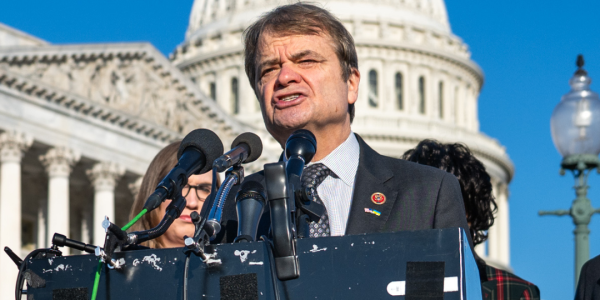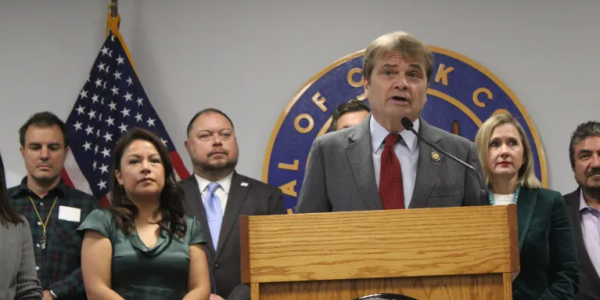Racial Justice
Every day that I serve in Congress in Washington, D.C., I walk through our Capitol, which serves as a symbol of freedom and democracy at home and around the world. But I’m also struck by the fact that it is a building built by enslaved people and is still filled with numerous statues commemorating Confederate leaders. As we reckon with that past, we must find ways to pursue justice every day here in the present. It is my responsibility to listen and help build a future where American policy reflects the fundamental truth that Black lives matter. We have a once-in-a-generation opportunity to shape that future.
Police Reform
George Floyd, Breonna Taylor, Laquan McDonald, Michael Brown, and Tyre Nichols. These are just a few of the names of Black Americans who have died at the hands of police. While I believe that the vast majority of law enforcement officials are good men and women who want to make their communities a safer, better place to live, there are still too many instances where unconscious bias or systemic racism has negatively impacted Black communities. Black Americans have spent decades demanding change and despite this, we continue to see unarmed African Americans killed time and time again. Going for a jog, or a drive, or simply being in your own home should not be a death sentence.
We must enact transformative changes to a system that has failed Black communities for too long. We must hold the police accountable for their actions because no one - not even the police - is above the law. We must immediately ban the use of chokeholds by law enforcement; we must encourage departments to meet a gold standard in training, hiring, and de-escalation strategies; and we must end the militarization of our local law enforcement departments.
We also need to reexamine our budget priorities and invest in our communities, rather than treat every problem like it can be solved with more law enforcement. Police departments have said that they are overextended. There must be a significant realignment of law enforcement responsibility so that social workers and mental health experts are called upon more often, instead of making the police line respond to all of society’s ills. These changes require more federal funding to support social programs.
I strongly support the George Floyd Justice in Policing Act, which would achieve substantial structural change to end the cycle of police violence. It includes critical changes like ending qualified immunity so police can be sued for misconduct, demilitarizing the police by limiting the transfer of military weaponry to state and local police departments, combating police brutality by requiring body and dashboard cameras, banning chokeholds, and ending the use of no-knock warrants. It will also press the Justice Department to address systemic racial discrimination by law enforcement.
Criminal Justice Reform
As a defense attorney, I witnessed the inequities in our justice system firsthand. From mandatory minimums to the school-to-prison pipeline, the criminal justice system is one of many systems in our country that perpetuate cycles of inequity. There should not be separate justice systems for those born rich or white and another for those who are born Black or poor. We cannot simply rely on bias training or police reform to eliminate these injustices. The flaws in our justice system demand significant changes, including ending unfair sentencing that involves nonviolent drug offenders, which disproportionately affects minorities. These sentences are often not proportionate to the seriousness of the crimes committed and reforming unfair nonviolent drug sentences must be at the heart of any serious criminal justice reform effort. Incarcerating large numbers of minorities for decades-long sentences tears our most vulnerable communities apart and makes it more difficult for them to break out of the cycle of poverty. Not only are many of these sentences inequitable, but they are costing American taxpayers $80 billion each year. I will continue to fight for a criminal justice system that protects the rights of all individuals and invests in practices proven to decrease crime and recidivism across the country.
Voting and Civil Rights
"I have said this before, and I will say it again. The vote is precious. It is almost sacred. It is the most powerful non-violent tool we have in a democracy." - Rep. John Lewis
There is no right in our country that is more sacred than the right to vote. Men and women throughout our history have been beaten, imprisoned, and killed to ensure that all Americans can freely exercise their right to vote. Unfortunately, there are still those who are working to turn back the clock and undo the hard-won victories of our nation’s civil rights heroes. We owe it to leaders like John Lewis to do everything in our power to push back against those efforts and ensure that any barriers erected between Americans and the ballot box are torn down.
Since the 2020 election, many States have passed discriminatory voting laws that make it more difficult for people of color and low-income individuals to vote. We are witnessing an outbreak of voter suppression laws sweeping across the country. From voter identification laws to voter roll purges, local and state officials are making it harder for Americans to vote. After the devastating loss of Civil Rights icon John Lewis, I believe that the best way we can honor his legacy is through passing the John Lewis Voting Rights Advancement Act, which would restore the Voting Rights Act, combat dangerous voter suppression, and ensure that no one who wants to cast their vote is unable to.

